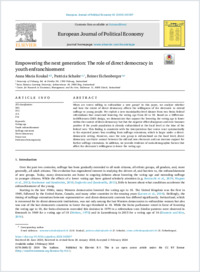Empowering the next generation: The role of direct democracy in youth enfranchisement
BP2-STS
- Koukal, Anna Maria University of Fribourg
- Schafer, Patricia ORCID University of Fribourg
- Eichenberger, Reiner University of Fribourg
- 2024
Published in:
- European Journal of Political Economy. - Elsevier BV. - 2024, vol. 81, p. 102507
English
When are voters willing to enfranchise a new group? In this paper, we analyze whether and how the extent of direct democracy affects the willingness of the electorate to extend suffrage to young people. We exploit a new municipality-level dataset from two Swiss federal referendums that concerned lowering the voting age from 20 to 18. Based on a Differencein-Differences (DiD) design, we demonstrate that support for lowering the voting age is lower within the context of direct democracy but that the negative effect disappears and even becomes positive if the youth population is already enfranchised at the local level at the time of the federal vote. This finding is consistent with the interpretation that voters react systematically to the expected power loss resulting from suffrage extensions, which is larger under a directdemocratic setting. However, once the new group is enfranchised on the local level, direct democracy can foster contact between the old and new electorate and can increase support for further suffrage extensions. In addition, we provide evidence of socio-demographic factors that affect the electorate’s willingness to lower the voting age.
- Faculty
- Faculté des sciences économiques et sociales et du management
- Department
- Département d'économie politique
- Language
-
- English
- Classification
- Economics
- License
- Open access status
- hybrid
- Identifiers
-
- DOI 10.1016/j.ejpoleco.2024.102507
- ISSN 0176-2680
- Persistent URL
- https://folia.unifr.ch/unifr/documents/328592
Statistics
Document views: 94
File downloads:
- 1-s2.0-s0176268024000090-main: 129
